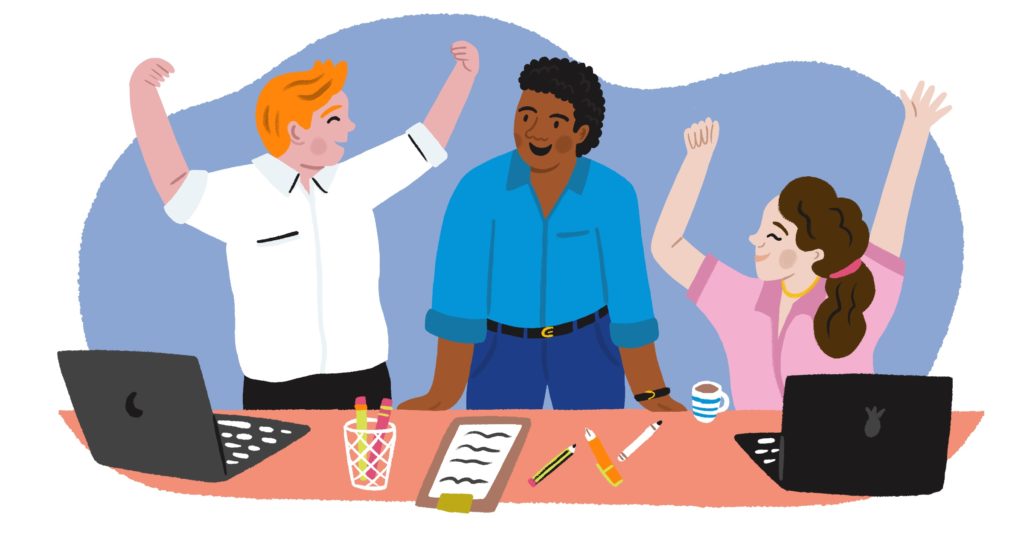
By Michelle Seitzer
There’s plenty of research about the reasons employees with ADHD may struggle in the workplace. But there are also many success stories — stories of workplaces where people without ADHD and people with ADHD work well together. This teamwork helps their organizations succeed — and it’s in part because of their employees with ADHD — and because the entire office has figured out how to work best together.
ADHD Online employs a number of people who have ADHD themselves, including ADHD Online CEO Zach Booker and other members of the executive leadership team. We asked three ADHD Online employees who do not have ADHD to share what it’s like to work with colleagues who have ADHD. We asked them about the challenges and benefits, along with their tips on creating the most effective and efficient workplace.
We talked with Kathy Hutchins, ADHD Online’s controller, Shanille Commons, talent acquisition manager, and Julie Ilbrink, executive administrator. Here’s what they had to say.
The challenges of working with people with ADHD:
Commons: “My team is full of wonderful, bright ideas, and they give feedback on the daily — which helps our team improve, innovate and bring a general awareness of strengths and weaknesses within the team. The challenge with this is that at times, these ideas have to be grounded in reality or slimmed down to the best idea to implement — due to the sheer amount of ideas and feedback I receive every day.”
Common says the energy can sometimes be too much, or can be distracting, to other company employees.
Hutchins: “I’d say that’s the biggest challenge: knowing how to work with each person to accomplish the tasks you need to complete.”
Ilbrink says she often finds herself implementing all that she’s learned as an ADHD parent to keep her team focused, on track and successful. “There are times I find it challenging because of the fast-paced nature of how those with ADHD come up with ideas or pivot on a dime, and how they can be in the middle of numerous projects simultaneously,” she says.
The benefits of having people with ADHD on your team:
Commons: “My team is great at adapting to change and making the quick shifts we need to in an early-stage company like ours.”
Commons adds that the authentic perspective her employees with ADHD bring to the table is also valuable. “My team has such a personal stake in what our company does that they are able to accurately represent the feelings, frustrations and experiences of those who have ADHD. And it’s one of the reasons for our continued success as a company,” she says.
Ilbrink: “There are also times when it’s so rewarding, because the brainstorming and ideas generated are endless.”
Ilbrink adds that her co-workers with ADHD are able to focus on the possibility of successful ventures and can think in very innovative ways. “It can be very energizing to be witness to — and a participant in — that thought process,” she says.
Hutchins: “I see all levels of employees that have it — from the hourly to the executives — and it’s not something anyone should be afraid to say they have. There’s not a thing they can’t accomplish. And by working with colleagues who have ADHD, I might learn a different route that was better than the one I wanted to take.”
Commons emphasizes how many people with ADHD are highly innovative thinkers, which can be invaluable in solving issues. She also says she’s learned that many people with ADHD are extremely caring individuals who tend to overthink their actions with others and how they present themselves. “This typically creates a very empathic, kind and caring person because they understand what this struggle may feel like,” she says.
Ilbrink: “What has surprised me about working with so many people with ADHD is how well they all get along, how well they work together and how quickly things get done. I have never before witnessed the intense hyperfocus a collective group of people with ADHD can exhibit when they are all trying to accomplish a common goal. I anticipated that everyone would be going down their own path, doing their own thing and be extremely scattered. However, this team has proven otherwise. I’m truly blessed to be a part of such an amazing team, and to use my focus and organizing skills to help the entire business succeed!”
What they’ve learned about people with ADHD:
Hutchins: “What surprises me is that there are some people I’d assume might have ADHD without them telling me — like Zach, our CEO. But then there are others that I would not have put two and two together — like one of our VPs. And I only knew it because he mentioned his diagnosis.”
Commons: “I associated ADHD with hyperactive children who couldn’t sit still in class, but ADHD symptoms are not always that stereotype or scenario. But it can actually lead to a very hyper-focused individual who is excellent at details and extremely accountable — and I would have had no idea that was possible until I worked at ADHD Online.”
Hutchins: “This is the first time I have actually worked with people with ADHD that I know of. This might be because I am the minority here without it. But it’s interesting since they are all different, so one way of dealing with one person isn’t the same for the other person — when ADHD is involved.”
Tips for working with people with ADHD:
Commons: “I approach working with colleagues who have ADHD just like I would any other co-worker. ADHD presents and affects each person differently, just as each individual person (with or without ADHD) has preferences of how to collaborate and what works best for them.”
Commons manages a team of four employees — each with ADHD. “As I have learned more about each of them, I have found the specific methods of communication, approaches and work styles that each prefers. Then I adjust my behaviors accordingly to what works best for each of them.”
Ilbrink: “Having raised children with ADHD, I learned to adapt my communication techniques, to be more liberal with the timing of desired outcomes and to become more understanding of how their brains process information.”
Ilbrink: “I take a notebook into every meeting and take detailed notes so I can go back later to confirm that what was discussed is what is still wanted or needed.”
Hutchins: “One of the best tips I have is telling the person you’re working with that you do not have ADHD. You’re learning how to work with them and make adjustments, but they also need to realize they’re working with someone that doesn’t have ADHD. So they need to give a little too.”
Commons allows time for feedback and brainstorming sessions, as well as creating project lists with assigned due dates or priorities to help with direction and focus.
She also offers breaks throughout the day so her employees with ADHD can rest their minds, and she’s found that flexible schedules help too. “I do this so that when they’re having an off day, they don’t feel as if they’re failing to meet the standards set,” she says. “I’m here to offer a listening and understanding ear too.”
Ilbrink: “I have found that creating a list of the items that need to be accomplished — along with visual diagrams and timelines to assist those who like to see how all the pieces fit together — has been helpful. They may get lost in all the words, so pictures have a lot of positive impact.”
Ilbrink: “I also keep my working to-do list updated, and hold a meeting at least twice a week with my supervisor to review the items I still have to complete in order to make sure that’s the direction he still wants to go. Taking a notebook and pen with me into every meeting is essential so that I can capture the ideas or instructions that are quickly generated — and just as quickly forgotten if not written down to be held accountable.”
Adds Hutchins: “We all want to get to the same place and there are many different paths to get there. None of them are wrong, as long as we both end up at the same place at the same time.”






